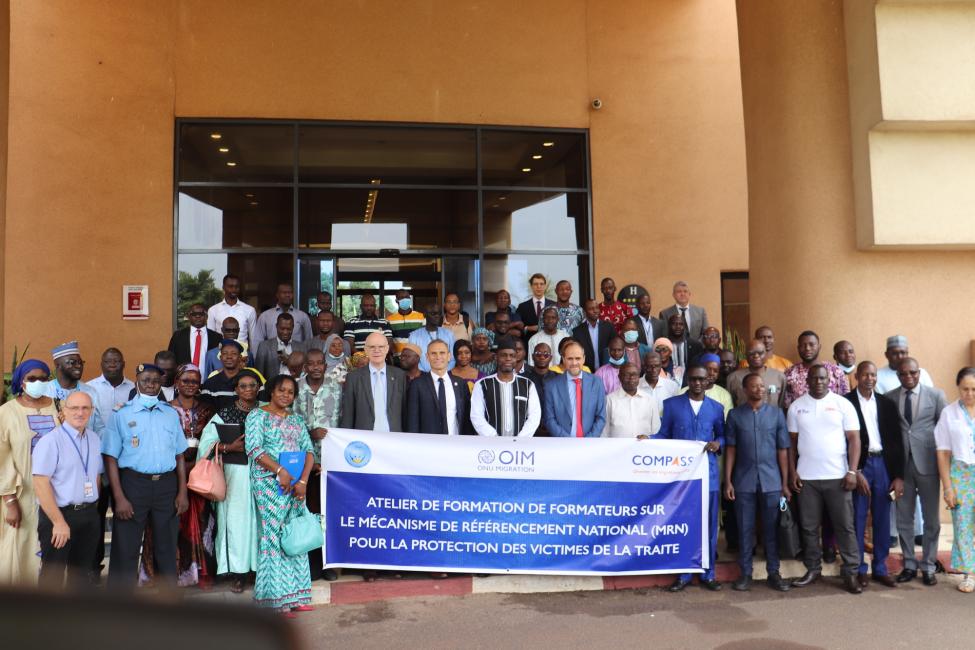-
Who we are
WHO WE AREThe International Organization for Migration (IOM) is part of the United Nations System as the leading inter-governmental organization promoting humane and orderly migration for the benefit of all. IOM has had a presence in West and Central Africa since 1998.
About
About
IOM Global
IOM Global
-
Our Work
Our WorkAs the leading inter-governmental organization promoting humane and orderly migration, IOM plays a key role to support the achievement of the 2030 Agenda through different areas of intervention that connect both humanitarian assistance and sustainable development. Across West and Central Africa, IOM provides a comprehensive response to the humanitarian needs of migrants, internally displaced persons, returnees and host communities.
Cross-cutting (Global)
Cross-cutting (Global)
- Where we work
- Take Action
- Data and Resources
- 2030 Agenda
The Government of Mali, IOM, Netherlands, and EU Launch a Dissemination Campaign of the National Referral Mechanism for the Protection of Victims of Trafficking in Mali
Bamako – The Government of Mali and several technical and financial partners, including the International Organization for Migration (IOM), Netherlands Embassy and European Union Delegation, launched on 13 September 2022 in Bamako a series of training of trainers’ workshops for the dissemination of the National Referral Mechanism (NRM) for protection of victims of trafficking in persons in Mali.
Developed by members of the National Coordinating Committee to Combat Trafficking in Persons and Similar Practices in Mali, with the support of IOM, the NRM for the Protection of Victims of Trafficking in Persons was validated in 2021. It outlines the cooperation system through which Malian authorities, civil society and international institutions coordinate their actions to effectively refer victims of trafficking to the relevant actors for assistance. In a bid to facilitate its dissemination, training of trainer’s workshops are being initiated in Bamako and seven other regions of Mali, from 13 September to 22 November 2022. In the end, 220 trainers, technicians, service providers and social workers involved in protecting victims of trafficking will be trained, not only to apply the referral procedures and mechanisms, but also to train other actors at various levels.
According to Mr Pascal REYNTJENS, IOM Chief of Mission in Mali, it is important that all actors take ownership of this NRM. “Trafficking in persons is a crime and a serious human right violation, which occurs in countries at peace as well as in conflict and disaster areas. Capacity building through training of trainers is an essential element to ensure better protection of victims. There is still a lot of work to be done and IOM will work particularly hard on this, in synergy with the National Coordinating Committee to Combat Trafficking in Persons and Similar Practices,” he said.
Mr Marchel GERRMANN, Ambassador of the Netherlands to Mali reiterated his country’s support to the fight against trafficking. “The Netherlands is and will remain committed to the fight against trafficking in persons and smuggling of migrants. We are proud to be part of this initiative which aims to improve protection and opportunities for these people in vulnerable situations,” said Mr GERRMANN.
The EU Ambassador to Mali, Mr Bart OUVRY, highlighted the significance of this cooperation. “The European Union and its Member States, through a shared vision of combating irregular migration and promoting human rights, jointly support the implementation of activities against migrant smuggling and trafficking in persons and in favour of adequate protection and care of the victims,” he said. “The overall objective of the NRM is to enable better care for victims of trafficking in Mali. Its implementation will facilitate the full application of existing laws,” said Mr Mamadou KASSOGUE, Minister of Justice and Human Rights, Keeper of the Seals.
After Bamako, the focus will be on the regions of Gao, Kayes, Koulikoro, Mopti, Ségou, Sikasso, and Timbuktu for training of trainer’s workshops, until 22 November 2022. At each stage, a module on the legal and institutional framework of trafficking in persons in Mali, as well as two standard operating procedures on the framework of cooperation in the detection, identification, assistance, and protection of victims of trafficking will be presented to participants. They will be expected to disseminate the NRM in all regions of Mali.
For more information, please contact IOM Mali Media and Communications Unit. Tel: +223 90 50 00 06.



